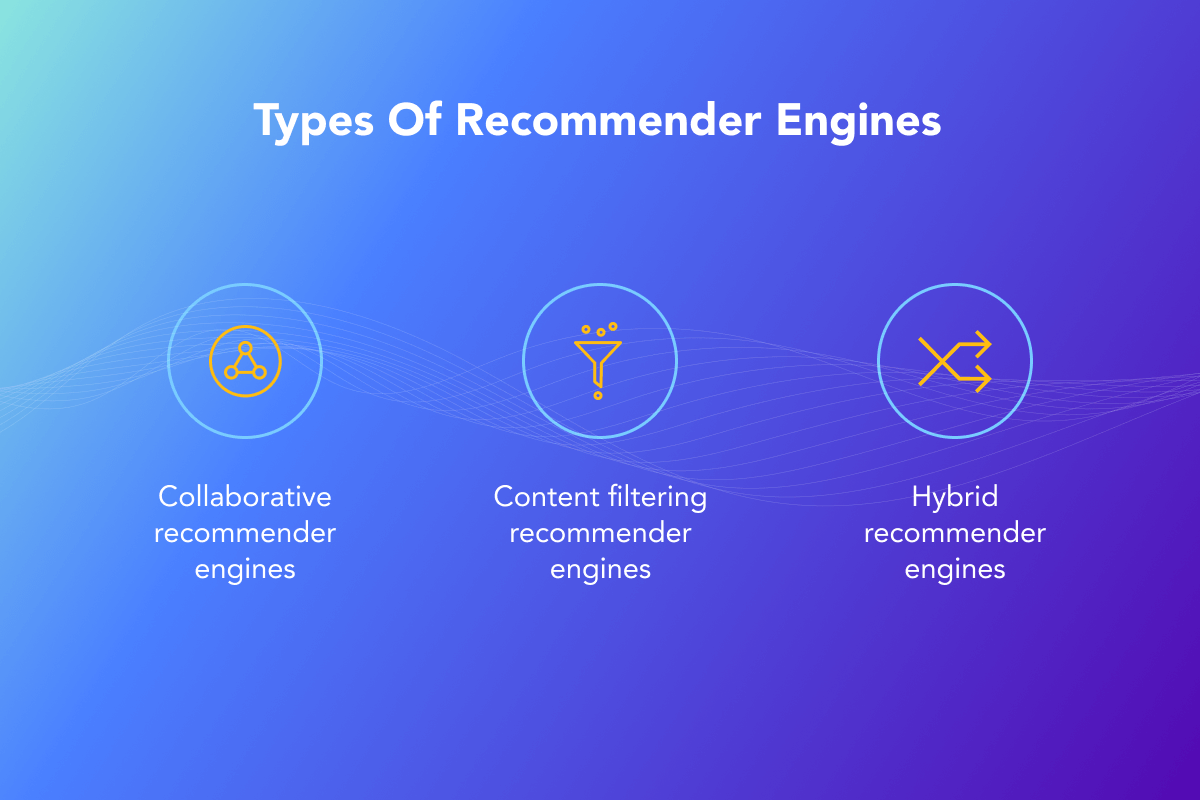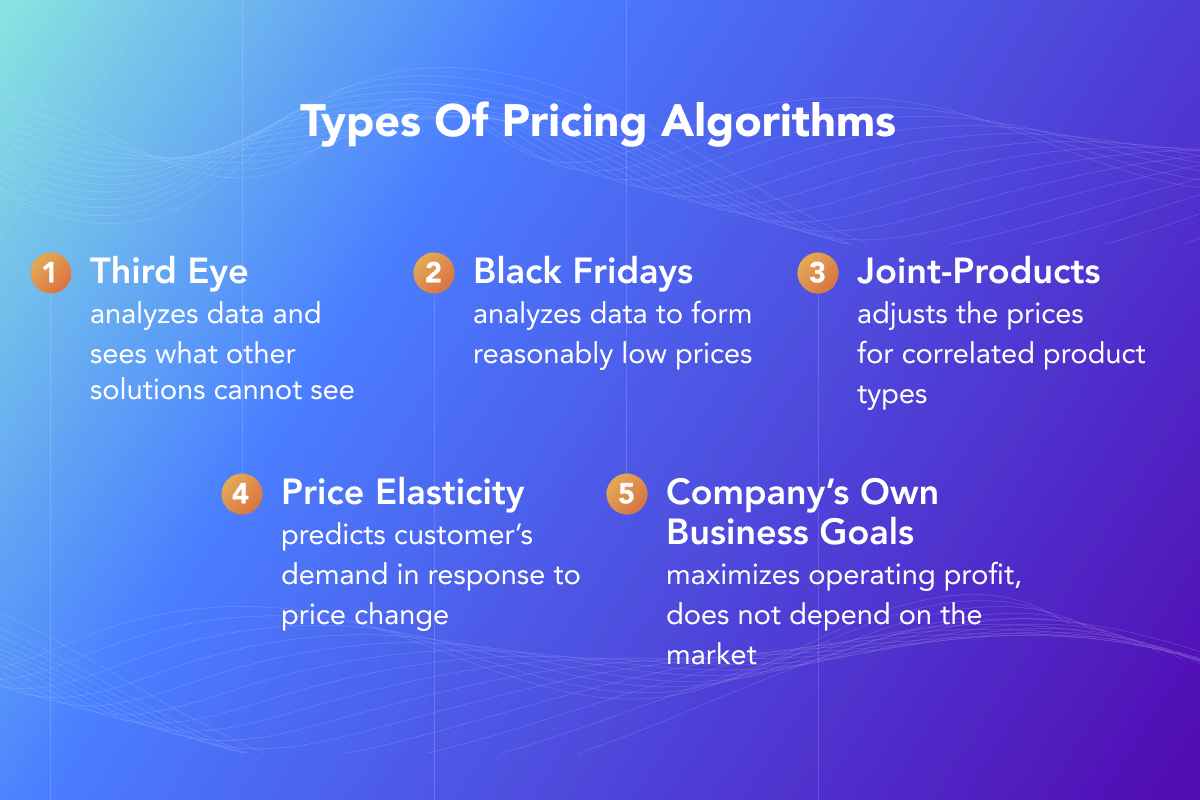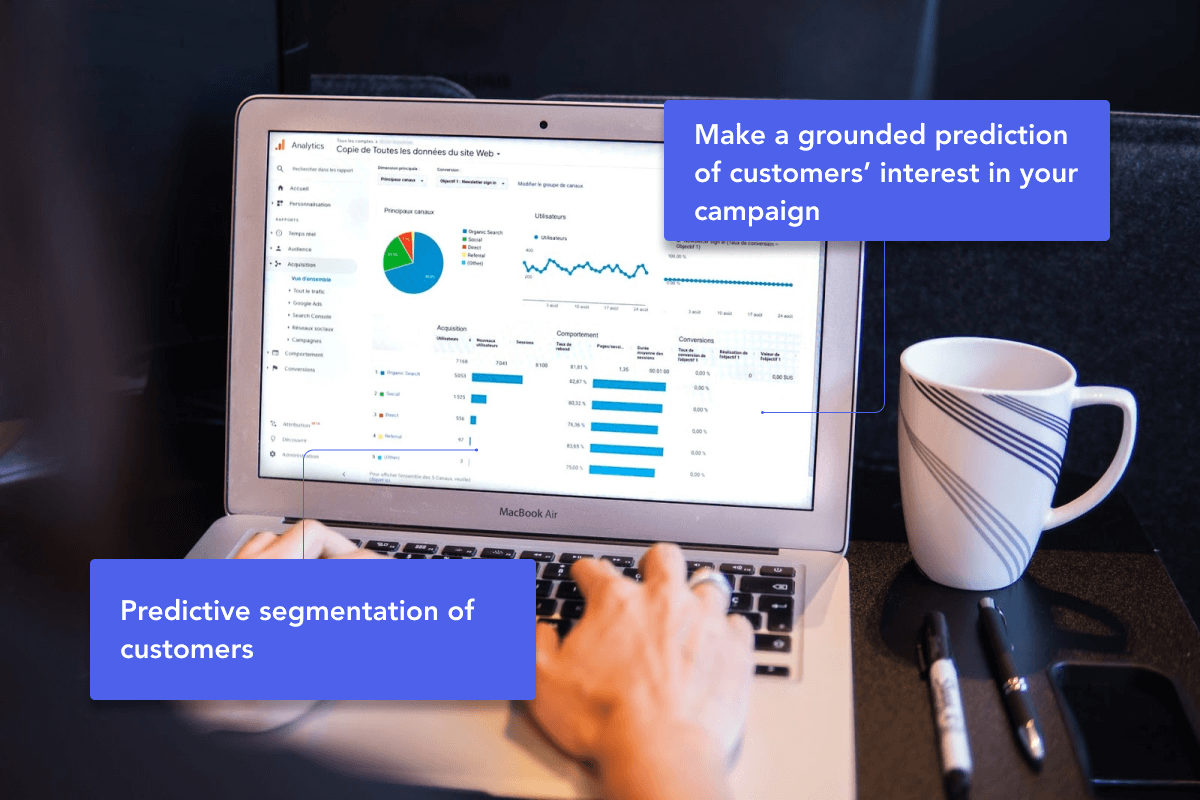When you see particularly appealing products on the web, it means that machine learning algorithms have selected them for you.
Data science in e-commerce allows companies to collect, analyze, and apply valuable information for improving sales and marketing processes. Smart technologies sneak into e-commerce and boost profits with personalized recommended lists, dynamic pricing, and prediction of customers’ buying behavior.
AI and Data Science Use Cases in E-commerce
To get machine learning data science solutions, e-commerce companies share their domain expertise with developer companies, and the latter rig it with algorithms and models from AI, mathematics, and statistics fields. With the help of these kits, e-commerce companies can leverage more aware business strategies and make evidence- and insight-based decisions.
In this article, we’ll take a dive into AI and data science use cases in e-commerce, such as:
- Recommender engines a.k.a. recommendation systems
- Pricing algorithms
- AI algorithms for predictive segmentation
- Personalized product image search algorithms
- Chatbots and Intelligent Virtual Assistants
Recommender Еngines: Types and Use Cases
This part is about the types of recommender engines and how e-commerce companies apply them.
Recommender engines in machine learning for e-commerce show ”recommend” to the customers and provide them with a personalized list of products. The recommendation contains items that customers are most likely to purchase based on their prior buying choices.
Recommender Engine Case Study & Customer Review
AI recommender engines operate in three steps:
- Recommender engines analyze users’ prior buying behavior.
- Recommender engines predict new probable purchases of the users.
- Recommender engines select or show the products or services users are most likely to purchase again.
These systems crawl on the Internet and analyze either users and items or user-item interactions. There are three types of recommender engines: collaborative, content filtering, and hybrid.

Collaborative Recommender Engines
The logic behind collaborative engines reads: if someone liked something in the past, they would like this or a similar product again. In this type of engine, the user “collaborates” with the system.
Applications of Collaborative Recommender Engines:
- The most vivid application of collaborative recommender engines is Facebook. This wide arena for e-commerce recommends millions of its users new friends and groups based on their prior choices.
- CNET considers AI use cases to be the puppet master of 70% of all videos people watch on Youtube riding the recommender chain.
Content Filtering Recommender Engines
Content filtering recommender engines on your website use the properties of your products and a temporary profile of an unregistered user. The system creates a temp user profile to analyze the user’s prior preferences in order to recommend the products on your website.

Application of Content Filtering Recommender Engines:
You often see retail applications of recommender engines based on content filtering as all kinds of lists of recommended items in online catalogues. Here, the AI system selects and shows products similar to those users have already clicked on.
Hybrid Recommender Engines
Hybrid recommender engines are the most popular and blend collaborative, content, and other types into one. This engine aims to form a more convincing recommendation list for users and achieve better engagement and conversion rates. Its power lies in retrieving substantially different data about users. A hybrid recommender engine can develop its constituent types of engines separately and then blend them to form one. Or it can develop one of the constituent types and further enhance it with elements from other types.
Application of Hybrid Recommender Engines:
Machine learning use cases in recommender engines are capable of significantly raising conversion and driving sales. For large e-commerce companies, there is no question of whether or not to use automation in marketing. The question is what type of automation they will apply to better compete in the market.
For example, to make recommendation lists of movies for their users, Netflix is using the hybrid recommender engine designed by BellKor’s Pragmatic Chaos company. This approach blends 107 approaches into one prediction. In particular, it combines users’ watch, search, and rate behavior.
Softengi develops effective machine learning e-commerce solutions with recommender engines for both easy and complex marketing tasks.
Pricing Algorithms in E-commerce
Machine learning algorithms for e-commerce can adjust prices to increase sales and maximize profits. This part is about the types of machine learning pricing algorithms and how e-commerce companies apply them.
Effective pricing is one of the milestones of effective business strategies. With the help of machine learning, e-commerce companies can develop pricing algorithms that automatically adjust the prices of items/services depending on data changes in the market or in the company. For example, AI solutions can make smart entry prices, discount prices, promotion prices, and similar.
Types of price adjustment in the companies:
- Dynamic pricing. Businesses use dynamic pricing when they change prices depending on the market (competitors).
- Price optimization. Companies perform smart price optimization when they change prices to maximize operating profit in different scenarios.

Applications of Smart Pricing Algorithms in E-commerce
There are multiple pricing algorithms that can be applied depending on a specific situation. Such algorithms include:
- “Third eye”
- “Black Fridays”
- Algorithms for Profit Maximization
- Joint-products algorithms
- Price Elasticity Prediction Algorithms
Let’s take a look at each of them.
Third Eye Pricing Algorithms
The “Third eye” machine learning pricing solution will analyze for example a customer on your site, see opportunities for sales and adjust the price accordingly. These smart pricing algorithms can find correlations in enormous volumes of data that your business may need. Meanwhile, your competitors with non-smart types of pricing solutions cannot do this. On their sites, they will not even recognize this potential buyer. Fast reaction on market opportunities promptly raises the return on investment.
Black Fridays Pricing Algorithms
When retailers organize a sell-off at the end of the season, their main goal is to get rid of the old products to give space for the new ones. The price drop is dramatically low. Still, a profit-driven business wants to be smart about the price cuts. “Black Fridays” machine learning pricing algorithms make analysis to form a reasonably low selling price for the products that the personnel and common solutions can underestimate.
AI Pricing Algorithms for Profit Maximization
E-commerce businesses may apply certain prices to particular products to maximize the operating profit of the business and raise business resilience. In this scenario, the product’s price does not depend on outer conditions as competitors, and demand. Instead, it depends on the company’s inner goal to raise the profit. To do so, AI solutions developer companies design and train flexible pricing algorithms that can learn the set of required patterns and further do price optimization based on them.

Joint-products Pricing Algorithms
Different types of products that customers buy together usually correlate in price. “Joint-products” pricing algorithms are based on machine learning retail and can adjust prices not only in product categories but also by product types. A large online retailer will no longer adjust products’ prices in a product category and then manually correlate items among different product types. But they will run at once through the whole assortment of product types and categories while correlating items in different product types. Thus, you will promptly get the precise prices for your entire assortment that do not need further attention.
Price Elasticity Prediction Algorithms
Whether or not to raise the prices and for how much is now much easier to answer. Your machine learning pricing algorithms for elasticity will analyze big data and predict the quantity of products you will need to supply if you raise the price, what price will result in what demand, and how price optimization in your company can look.
Softengi develops effective machine learning pricing solutions for SMEs and large businesses.
AI Algorithms for Predictive Segmentation of Customers
Data science in e-commerce can be applied for analyzing customer behavior and performing segmentation. This part is about AI algorithms that can predict customer interest in your products and how e-commerce companies can use these algorithms.

AI algorithms for predictive segmentation of customers analyze many parameters of the data in order to compare users, items, and records of their prior interactions. Such solutions predict the customers’ possible reactions to your products based on the analyzed information.
Application of Predictive Segmentation of Customers in E-commerce
Companies often make marketing campaigns in search engines or social media platforms. They target their campaigns and make customer segmentation to reach the goals. AI algorithms can analyze the customer and make a grounded prediction of their interest in your campaign. Then, it makes a grounded decision whether or not to include this user in the target audience of your marketing campaign. Thus, companies will not pay per view of an irrelevant user or for a user’s click with potentially low conversion.

AI Algorithms for a Personalized Search of Product Images
This part is about machine learning solutions for e-commerce that do a personalized search of product images and how online retailers can apply these solutions.
Forbes 2020 research gives convincing coverage of the customers’ needs in personalized offers. It quotes Accenture as saying:
“91% of consumers say they are more likely to shop with brands that provide offers and recommendations that are relevant to them.”
Thus, the task of the online retailer companies is to show the correct customer their most fitting image – that means to personalize the image search results by applying AI algorithms.
Applications of Personalized Search of Product Images in E-commerce
Among popular tools for product browsing via product images are Google Lens and Image Search. It is easy for the customers to skip keywords-play with the search engines and go directly to what they want. Both clients and the companies upload so many images that machine learning algorithms have no difficulty matching demand and supply.
Machine learning retail applications in SMM ground on images whether companies do campaigns or display their products. Thus, Pinterest allows clients can upload their clothes’ images, find, and buy matching clothing items.
Smart Assistants: AI Chatbots
This part is about the current demand of e-commerce companies in AI chatbots and how e-commerce companies can apply AI chatbots.

Many large chain retailers, for example, in the cosmetics industry, had to close their physical shops and go online. This led to an enormous number of online orders. One of the constituent parts of their business solution was:
- Moving all the products online, even the ones that were not supposed for online sales,
- Enhancing online shops with extensive filters,
- Enrolling more personnel.
Next-generation chatbots, called Intelligent Virtual Assistants, provide improved customer experience. Such AI-powered software uses Natural Language Processing to handle queries and respond in a more human-like way.
Applications of AI Chatbots in E-commerce
There are two major applications of chatbots:
- AI chatbots in your e-commerce company will text or talk with your clients online. They will help with personalized purchasing by navigating the clients through the massive volumes of products and their properties on site, comparing products, and combining them for customers. They solve the situations when clients cannot find what they need using filters on your site or the personnel is not responding.
- AI chatbots can emulate entire customer service and take online orders, take the customer’s details for shipment and inform them of their order details.
Softengi AI software development company designs and trains successful AI models. E-commerce companies can apply them to reach their outer and inner goals.
Conclusion
This article gives coverage of the leading AI models and applications of data science in e-commerce. They encompass recommender engines, pricing algorithms, predictive customer segmentation, a personalized search of product images, and AI chatbots. These models can apply as single solutions or in combination to solve different business needs. E-commerce companies are successfully using them for marketing and business objectives.
Contact Softengi to discuss developing custom AI-powered solutions for e-commerce and other industries.






